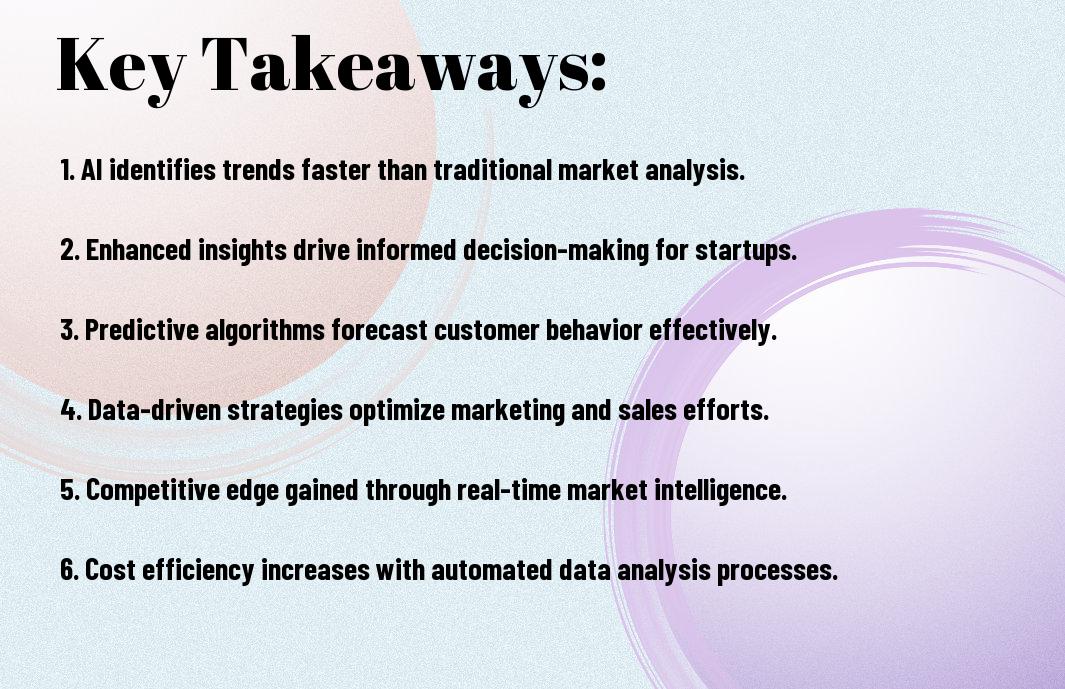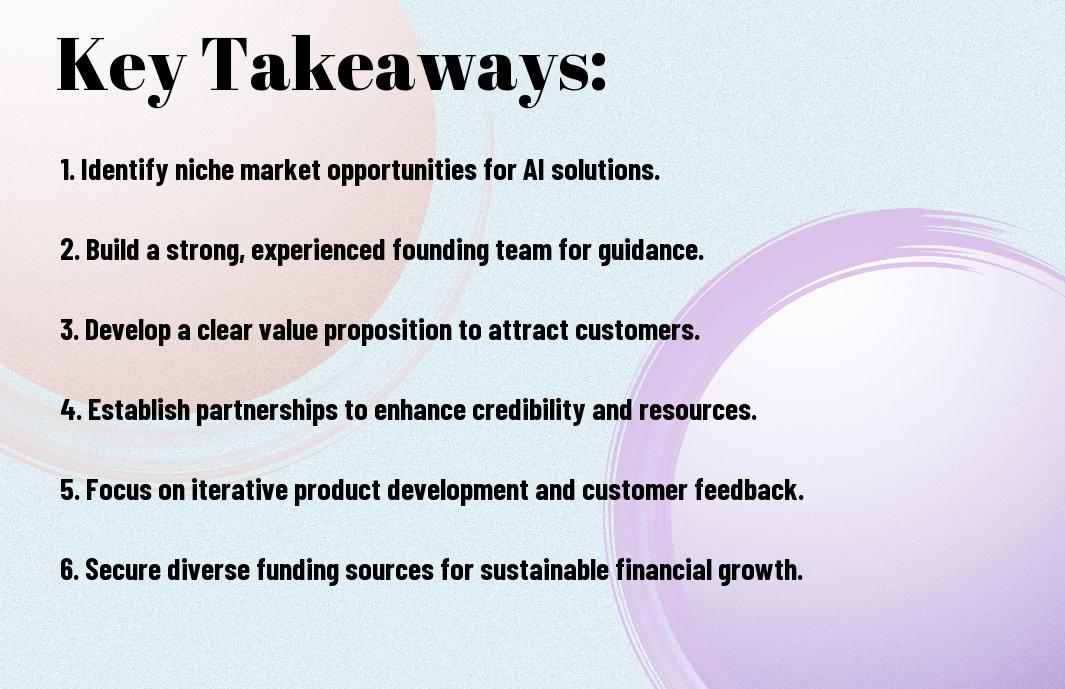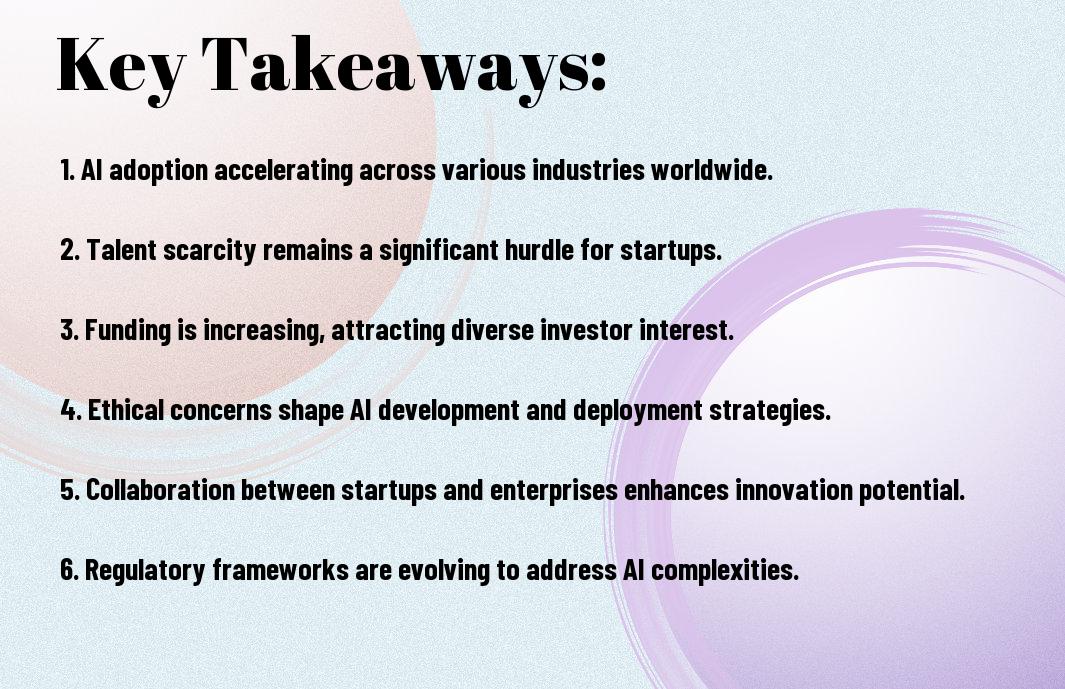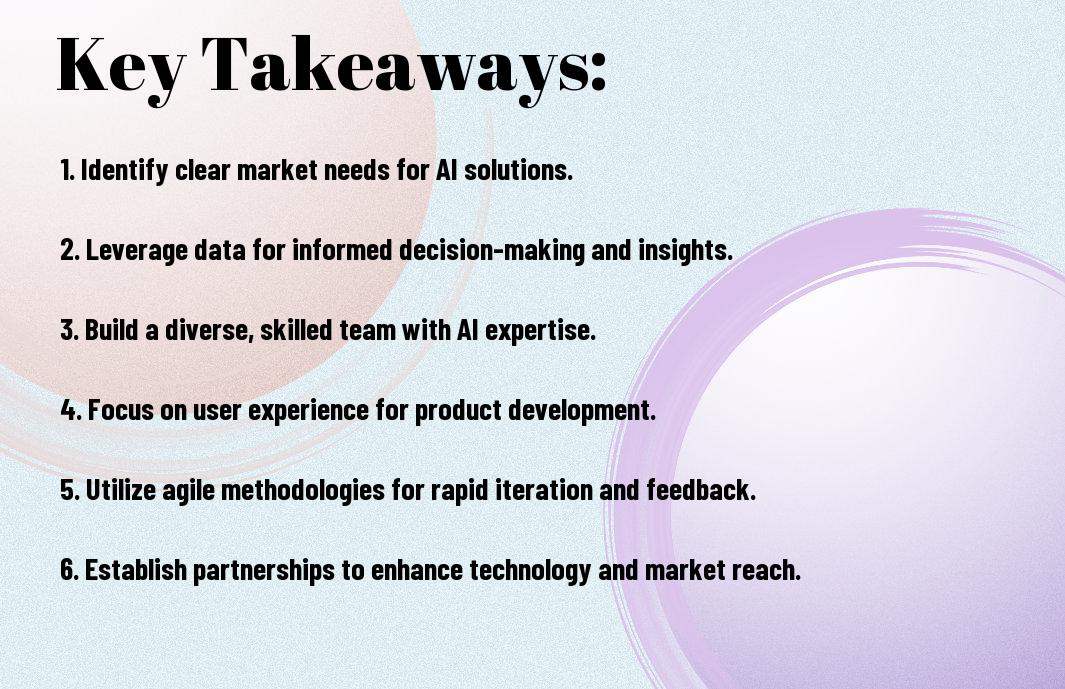As you navigate the competitive startup landscape, you need to make informed decisions to drive your business forward. Your ability to analyze market trends and identify opportunities is key to success. With the advent of AI-enhanced market insights, you can now gain a deeper understanding of your target audience and stay ahead of the competition. By leveraging these insights, you can optimize your strategy and accelerate your startup’s growth, ultimately achieving your business goals more efficiently.
Key Takeaways:
- Utilizing AI-enhanced market insights can significantly accelerate startup growth by providing data-driven decision-making capabilities, enabling businesses to respond quickly to market trends and stay ahead of the competition.
- AI-powered market analysis can help startups identify new business opportunities, predict customer behavior, and optimize their marketing strategies to maximize ROI and improve customer engagement.
- AI-driven market research can provide startups with real-time insights into their target audience, allowing them to develop more effective product development and marketing strategies that meet the evolving needs of their customers.
- By leveraging AI-enhanced market insights, startups can reduce the risk of launching new products or services, as they can test and validate their ideas with data-driven confidence, minimizing potential losses and maximizing potential gains.
- Integrating AI into market research and analysis can also help startups streamline their operations, automate routine tasks, and free up resources for more strategic and creative endeavors, ultimately driving innovation and growth.

The Current Landscape of Market Intelligence
A midst the rapid evolution of technology, you are likely aware that market intelligence plays a vital role in driving business growth, and you need to stay informed to make data-driven decisions.
Traditional Methods and Their Limitations
Beneath the surface of traditional market research methods, you will find limitations in terms of data analysis and insight generation, which can hinder your ability to respond quickly to changing market conditions.
The Emergence of AI-Driven Analytics
Across the market intelligence landscape, you are seeing a shift towards AI-driven analytics, which enables you to process vast amounts of data and uncover hidden patterns, giving you a competitive edge.
This emergence of AI-driven analytics is transforming the way you approach market intelligence, as you can now leverage machine learning algorithms to analyze large datasets, identify trends, and predict future market developments, allowing you to make more informed decisions and drive your business forward with confidence.

Core AI Technologies Transforming Market Research
The integration of AI in market research has revolutionized the way you gather and analyze data, enabling your business to make informed decisions. You can now leverage AI-enhanced market insights to accelerate your startup’s growth.
Machine Learning Algorithms for Pattern Recognition
Beneath the surface of traditional market research lies a wealth of untapped data, and you can uncover it using machine learning algorithms that identify patterns and trends, helping your business stay ahead of the competition.
Natural Language Processing for Sentiment Analysis
Alongside machine learning, you have natural language processing, which enables your business to analyze customer sentiments and opinions, allowing you to tailor your products and services to meet their needs.
Research indicates that natural language processing for sentiment analysis is a powerful tool, as you can use it to monitor social media, customer reviews, and feedback, providing valuable insights into your target audience’s preferences and pain points, helping you refine your marketing strategy and improve customer satisfaction, ultimately driving your startup’s growth and success.
Implementation Strategies for Startups
Now that you have decided to leverage AI-enhanced market insights, it’s time to develop a strategy for implementation, considering your startup’s unique needs and goals, to drive growth and stay competitive.
Cost-Effective AI Solutions for Early-Stage Companies
Alongside other considerations, an affordable and scalable AI solution is crucial for your early-stage company, allowing you to access valuable market insights without breaking the bank, and enabling you to make data-driven decisions that drive your business forward.
Integration with Existing Business Processes
Above all, seamless integration with your existing business processes is vital, ensuring that your AI-enhanced market insights are actionable and aligned with your overall business strategy, allowing you to maximize the benefits of AI and drive meaningful growth.
Companies like yours can integrate AI-enhanced market insights into their existing business processes by identifying areas where data-driven decision making can have the greatest impact, and then implementing AI solutions that provide actionable insights, enabling you to refine your strategy and drive growth, as you continue to scale and evolve your business.
Competitive Advantages Through Predictive Insights
After gaining access to predictive insights, you can make informed decisions to drive your startup’s growth, staying ahead of the competition with data-driven strategies.
Anticipating Market Shifts Before Competitors
About the time your competitors are reacting to market changes, you can be proactively adjusting your approach, leveraging AI-enhanced market insights to anticipate shifts and capitalize on emerging trends.
Dynamic Pricing and Product Positioning
On the path to optimizing your startup’s market performance, you will find that AI-driven insights enable you to adjust pricing and positioning in real-time, ensuring your products or services meet the evolving needs of your target audience.
Pricing strategies can be tailored to specific customer segments, maximizing your revenue potential, and with AI-enhanced insights, you can continuously monitor and refine your approach, ensuring your startup remains competitive and agile in a rapidly changing market landscape, allowing you to make the most of your resources and drive growth.
Data Collection and Management
Many startups struggle with collecting and managing large amounts of data, but you can overcome this challenge by implementing effective data collection and management strategies, allowing you to make informed decisions and drive growth.
Ethical Considerations and Privacy Compliance
Around the issue of data collection, you must consider ethical implications and ensure your practices comply with regulations, protecting your customers’ privacy and maintaining their trust in your brand.
Building Robust Data Infrastructure
Around the clock, your data infrastructure should be working seamlessly to support your business operations, and you can achieve this by designing a scalable and secure system that meets your specific needs.
Data infrastructure is the backbone of your startup’s data-driven decision-making process, and as you build yours, you should focus on creating a system that can handle large volumes of data, provide real-time insights, and support advanced analytics, enabling you to gain a deeper understanding of your market and make informed decisions to drive your growth and success.
Measuring ROI on AI Market Intelligence
All businesses strive to maximize their return on investment, and AI-enhanced market intelligence is no exception. You need to assess the effectiveness of your AI-powered market insights to ensure they drive your startup’s growth. By doing so, you can refine your strategy and allocate resources more efficiently.
Key Performance Indicators for Success
Besides tracking revenue growth, you should also monitor metrics such as customer acquisition costs, retention rates, and market share. These key performance indicators will help you evaluate the impact of AI-enhanced market intelligence on your business and make data-driven decisions to optimize your strategy.
Iterative Improvement Methodology
Between each iteration of your AI-enhanced market intelligence strategy, you should assess what works and what doesn’t. You can then adjust your approach to better meet your business objectives, ensuring continuous improvement and maximizing your ROI.
Understanding the iterative improvement methodology is key to getting the most out of your AI-enhanced market intelligence. You will be able to identify areas for improvement, refine your strategy, and ultimately drive your startup’s growth by continuously evaluating and adjusting your approach, allowing you to stay ahead of the competition and achieve your business goals.
To wrap up
On the whole, you now have the tools to accelerate your startup’s growth with AI-enhanced market insights. You can leverage these insights to inform your business decisions, drive innovation, and stay ahead of the competition. By harnessing the power of AI, you can unlock new opportunities and take your startup to the next level, achieving your goals and realizing your vision for your business, and ultimately driving your success.
FAQ
Q: What role does AI play in accelerating startup growth through market insights?
A: AI-enhanced market insights play a significant role in accelerating startup growth by providing actionable data-driven recommendations. AI algorithms analyze vast amounts of market data, identifying trends, patterns, and consumer behaviors that inform strategic business decisions. This enables startups to refine their products, target the right audience, and optimize their marketing efforts, ultimately driving growth and competitiveness in the market.
Q: How can startups leverage AI-enhanced market insights to inform their product development strategies?
A: Startups can leverage AI-enhanced market insights to inform their product development strategies by utilizing machine learning models that analyze customer feedback, preferences, and pain points. This analysis helps identify areas of improvement and opportunities for innovation, allowing startups to develop products that meet the evolving needs of their target market. Additionally, AI-driven insights can facilitate the prioritization of product features, ensuring that development resources are allocated efficiently and effectively.
Q: What are the key benefits of using AI-enhanced market insights for startup growth, and how can they be measured?
A: The key benefits of using AI-enhanced market insights for startup growth include enhanced decision-making, improved product-market fit, and increased efficiency in marketing efforts. These benefits can be measured through key performance indicators (KPIs) such as customer acquisition costs, customer retention rates, revenue growth, and return on investment (ROI) from marketing campaigns. By tracking these metrics, startups can assess the effectiveness of their AI-driven market insights and make data-driven adjustments to their growth strategies, ensuring continuous improvement and accelerated growth.









